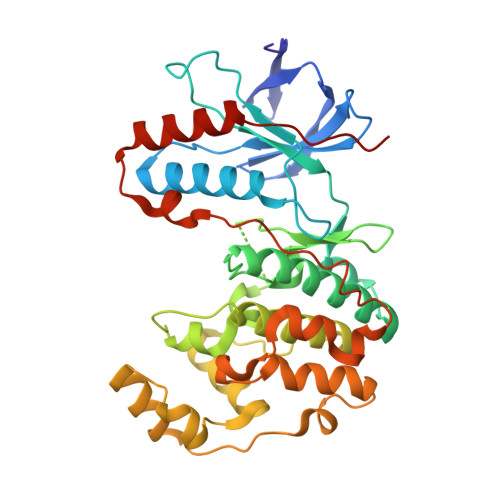Development of a fluorescent-tagged kinase assay system for the detection and characterization of allosteric kinase inhibitors.
Simard, J.R., Getlik, M., Grutter, C., Pawar, V., Wulfert, S., Rabiller, M., Rauh, D.(2009) J Am Chem Soc 131: 13286-13296
- PubMed: 19572644
- DOI: https://doi.org/10.1021/ja902010p
- Primary Citation of Related Structures:
3GCP, 3GCQ, 3GCS, 3GCU, 3GCV - PubMed Abstract:
Kinase disregulation disrupts the intricate network of intracellular signaling pathways and contributes to the onset of diseases such as cancer. Although several kinase inhibitors are on the market, inhibitor selectivity and drug resistance mutations persist as fundamental challenges in the development of effective long-term treatments. Chemical entities binding to less conserved allosteric sites would be expected to offer new opportunities for scaffold development. Because no high-throughput method was previously available, we developed a fluorescence-based kinase binding assay for identifying and characterizing ligands which stabilize the inactive kinase conformation. Here, we present a description of the development and validation of this assay using the serine/threonine kinase p38alpha. By covalently attaching fluorophores to the activation loop of the kinase, we were able to detect conformational changes and measure the K(d), k(on), and k(off) associated with the binding and dissociation of ligands to the allosteric pocket. We report the SAR of a synthesized focused library of pyrazolourea derivatives, a scaffold known to bind with high affinity to the allosteric pocket of p38alpha. Additionally, we used protein X-ray crystallography together with our assay to examine the binding and dissociation kinetics to characterize potent quinazoline- and quinoline-based type II inhibitors, which also utilize this binding pocket in p38alpha. Last, we identified the b-Raf inhibitor sorafenib as a potent low nanomolar inhibitor of p38alpha and used protein X-ray crystallography to confirm a unique binding mode to the inactive kinase conformation.
- Chemical Genomics Centre of the Max Planck Society, Otto-Hahn-Strasse 15, D-44227 Dortmund, Germany.
Organizational Affiliation:


















